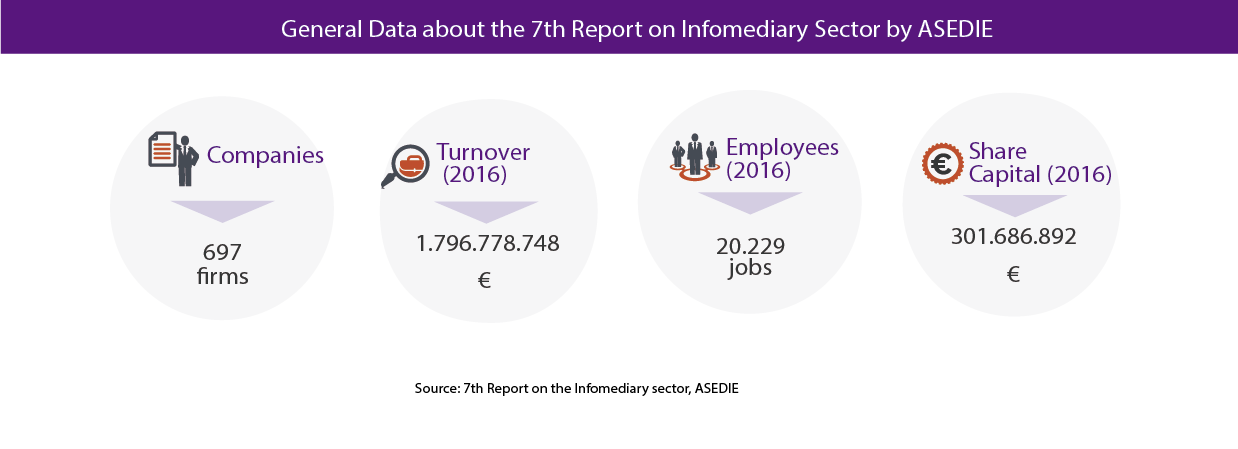
ASEDIE (Multisector Information Association) has published a new edition of the Infomediary Sector report, which analyses the real, economic and social value of companies reusing both public and private data to create value-added products.
The number of companies analysed on this occasion was 697, 35 more than in the previous edition. It should be noted that the financial information used for sales and employees corresponds to fiscal year 2017, because 2018 information was not yet available.
The main conclusions of the report are:
- 97% of Infomediary companies use open data from the public sector. In addition, three of four combine this information with private data. In this context, it is not surprising that 83% of surveyees believe that the opening of databases and access to them for reuse is apriority for the sector's evolution.
- More than 50% of the companies are located in the Community of Madrid (37%) and Catalonia (18%). However, the Infomediary Sector is represented in all the Autonomous Communities, with the exception of the Autonomous Cities of Ceuta and Melilla.
- 3 sectors continue to concentrate most of the activity. Most infomediary companies specialize in "geographic information" (22%), "market research" (21%) and the "economic & financial" subsector (20%).
- A sustainable sector, but with a large number of new companies. 60% of the companies analyzed have more than 10 years and almost one third (29%) exceeds twenty - as a curiosity, the oldest company dates from 1947-. But it is also a sector that attracts new actors, since 31% of companies have been created in the last 5 years.
- Turnover increased by 5.4% compared to the previous year. Specifically, the aggregated turnover in the Infomediary Sector is € 1,796,778,748. This figure is very positive, although it should be noted that most of the turnover is concentrated in a few big companies.
- And the number of employees increased by 4.6%, reaching 20,229 workers. These data are very positive, since national full-time employment was 2.9%.
- The aggregate subscribed capital of the sector exceeds 300 million euros. After two consecutive years of decline, the aggregate subscribed capital has experienced a 10% growth in this year, although it is lower than 2016.
- 70% of companies present benefits. 70% of the companies present an average profit of approximately 300,000 euros, with the average loss of the remaining 30% being similar, but with a negative sign. As in previous years, the net profit generated has exceeded 62 million euros.
- Low commercial risk. The probability risk estimated for a company over the last 12 months is moderate or minimum for 74% of companies.
- Data analysis and Big Data stand out again as the main challenges of the Infomediary Sector, followed very closely by the opening of new information sources. On the other hand, the barriers for reuse most mentioned by the surveyees are the different data availability between Autonomous Communities and City Councils.
The report ends by showing a series of success stories in infomediary companies, as re-users, and public sector, as open data publishers.
In short, we are facing a sector with good health, which has experienced a remarkable growth, and with positive prospects for the future: more than half of the surveyees (65%) estimate that the Infomediary Sector will grow over the course of this year, specifically 64% of them estimate the growth to be between 2-5%.
